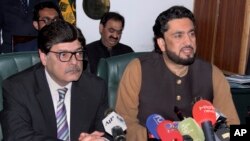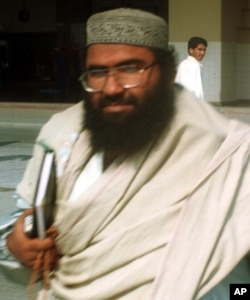Authorities in Pakistan have detained 44 suspected militants, including two relatives of the leader of the Islamist group that India accused of plotting a suicide car bombing in the divided Kashmir region.
The deadly February 14 blast in the Pulwama district killed 40 Indian security force members and almost brought the two nuclear-armed rival nations to the brink of war over allegations Pakistan-based anti-India Jaish-e-Mohammad, or JeM, plotted the violence.
Shehryar Afridi, Pakistan's state minister of the interior, told reporters Tuesday the detainees include Mufti Abdul Rauf, the brother of JeM leader Massood Azhar. The minister also said Massood Azhar's son, Hammad, was among those taken into custody.
Afridi said that Rauf and Hammad Azhar were on a list of suspects New Delhi shared with Islamabad last week as part of their dossier into the Pulwama attack.
“This is an across the board action. We don't want to give the impression that we are against one organization," Afridi said in a bid to dismiss suggestions the Pakistani crackdown was an outcome of Indian pressure.
The minister reiterated that Pakistan “won't allow the use of our soil against any country.” He went on to explain the 44 suspects already were under observation and taken into custody for investigation.
Pakistani officials are quoted by local media as confirming that Masood Azhar also is included in the Indian dossier as a suspect, and he could be detained soon for investigation.
Separately, the government in Islamabad has directed authorities to seize and freeze the assets of Pakistan-based Islamist entities and individuals who are listed as global terrorists by the United Nations. As part of the crackdown, the government also plans to take control of religious seminaries linked to the proscribed groups, say officials.
India and the United States have long accused Pakistan, particularly its powerful military institution, of harboring militant groups, including Lashkar-e-Taiba (LeT) and even leaders of the Afghan Taliban, to use as proxies in Kashmir and Afghanistan, charges Islamabad rejects.
Also Tuesday, authorities added two charities known as Jamaat-ud Dawa (JuD) and Falah-e-Insaniat Foundation (FIF), which are fronts for LeT, to the list of banned organizations. India alleges the LeT plotted the 2008 Mumbai attacks that killed 166 people.
The United States has outlawed LeT and the two charities as global terrorists and so has the United Nations. Washington also offers a $10-million bounty for the founder of LeT, Hafiz Saeed, who lives freely in Pakistan.
The Paris-based Financial Action Task Force (FATF) has been pressing Pakistan to effectively curb activities, financing and money laundering by terrorist groups involved in cross-border attacks. Pakistan’s failure to take required action could prompt the FATF to place it on its blacklist and trigger international financial sanctions on the country’s troubled economy.
Meanwhile, the Pakistani Foreign Ministry announced Tuesday that Pakistan’s high commissioner to India will be returning to New Delhi “after completion of consultations in Islamabad.” The announcement is another sign of the lessening of mutual tensions that had prompted both countries to recall their respective officials.
Islamabad denied involvement in the February 14 bombing in Indian Kashmir and swiftly offered New Delhi cooperation in investigating it.
Instead of responding to the offer, Indian fighter planes last Tuesday entered Pakistani territory to target what they said were JeM training camps. India called the action “non-military” and “preemptive” against future attacks.
Islamabad condemned what it said was a violation of its airspace and promised a military response, rejecting as false allegations that any camps existed at the site. Pakistani villagers also dismissed Indian claims of killing hundreds of militants and said only one man was wounded.
The following day, the Pakistani army said its fighter planes locked onto Indian military targets, but deliberately avoided them and fired on open ground instead, in order to avoid an escalation of tensions, but also to send a message to India not to violate Pakistani territory again.
In the aerial dogfight that ensued, officials said, an Indian MiG-21 was downed and the pilot was captured by Pakistani forces, raising fears of an all out war.
The pilot was returned to India two days later in what Pakistani Prime Minister Imran Khan said was a “gesture of peace,” helping to de-escalate the situation.















